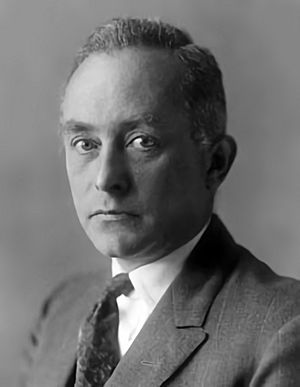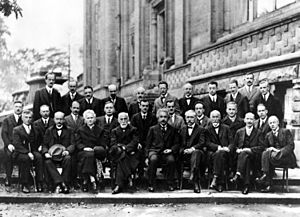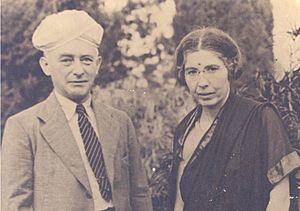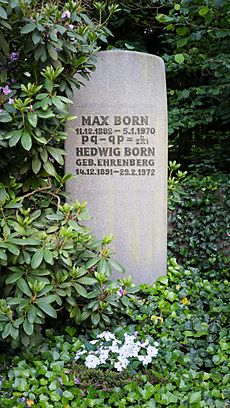Max Born facts for kids
Quick facts for kids
Max Born
|
|
|---|---|

Portrait c. 1930s
|
|
| Born | 11 December 1882 |
| Died | 5 January 1970 (aged 87) |
| Resting place | Stadtfriedhof, Göttingen |
| Citizenship | German, British |
| Alma mater | University of Göttingen |
| Known for | Born approximation Born coordinates Born equation Born probability Born reciprocity Born rigidity Born rule Born series Born square Born–Landé equation Born–Infeld theory Born–Haber cycle Born–Huang approximation Born–von Karman boundary condition Born–Oppenheimer approximation BBGKY hierarchy Cauchy–Born rule Adiabatic theorem Canonical commutation relation |
| Spouse(s) |
Hedwig Ehrenberg
(m. 1913) |
| Children | 3, including Gustav Victor Rudolf Born |
| Relatives | Olivia Newton-John (granddaughter) Georgina Born (granddaughter) |
| Awards | Nobel Prize in Physics (1954) Hughes Medal (1950) Max Planck Medal (1948) Fellow of the Royal Society (1939) |
| Scientific career | |
| Fields | Theoretical physics |
| Institutions | University of Frankfurt University of Göttingen University of Edinburgh University of Cambridge |
| Thesis | Untersuchungen über die Stabilität der elastischen Linie in Ebene und Raum unter verschiedenen Grenzbedingungen ("Investigations on the stability of the elastic line in plane and space under different boundary conditions") (1906) |
| Doctoral advisor | Carl Runge |
| Other academic advisors | |
| Doctoral students |
|
| Other notable students |
|
| Signature | |
Max Born (born December 11, 1882 – died January 5, 1970) was a German physicist and mathematician. He played a very important role in developing quantum mechanics. This is a branch of physics that studies matter and energy at the smallest possible scales.
Born also helped advance solid-state physics (the study of rigid matter) and optics (the study of light). Many famous physicists learned from him in the 1920s and 1930s. In 1954, Born won the Nobel Prize in Physics. He received it for his "fundamental research in quantum mechanics, especially in the statistical interpretation of the wave function". This means he helped explain how to understand the chances of finding tiny particles in certain places.
In 1904, Born started studying at the University of Göttingen. There, he met three famous mathematicians: Felix Klein, David Hilbert, and Hermann Minkowski. He earned his PhD by writing a thesis on the "Stability of Elastica in a Plane and Space". This work even won a university prize.
Later, in 1905, he began researching special relativity with Minkowski. He also wrote about the Thomson model of the atom. In 1918, he met Fritz Haber and they discussed how ionic compounds form. This process is now called the Born–Haber cycle.
During World War I, Born first worked as a radio operator. But because of his special knowledge, he was moved to research sound ranging. This helped the army find enemy artillery. In 1921, Born returned to Göttingen. He helped his friend James Franck get a job there too. Under Born's leadership, Göttingen became a top center for physics worldwide.
In 1925, Born and Werner Heisenberg created matrix mechanics. This was a new way to describe quantum mechanics. The next year, Born explained how to understand the probability of finding particles using the Schrödinger equation. This important idea earned him the Nobel Prize in 1954. His influence was huge. Many future Nobel laureates and famous scientists studied with him.
In 1933, the Nazi Party took power in Germany. Born, who was Jewish, lost his job at the University of Göttingen. He moved to the United Kingdom. There, he wrote a popular science book called The Restless Universe. He also wrote Atomic Physics, which became a standard textbook. In 1936, he became a professor at the University of Edinburgh. He continued his physics research there. Born became a British citizen in 1939, just before World War II started. He stayed in Edinburgh until 1952. He then retired to Bad Pyrmont in West Germany and passed away in Göttingen in 1970.
Contents
Early Life and Education
Max Born was born on December 11, 1882, in Breslau. This city is now called Wrocław and is in Poland. At that time, it was part of the German Empire. Max came from a Jewish family. His father, Gustav Jacob Born, was a professor who studied anatomy and how living things develop.
Max's mother, Margarethe, died when he was only four years old. He had a younger sister, Käthe, and a half-brother, Wolfgang. Wolfgang later became a professor of art history in New York.
Starting University and Meeting Great Minds
Born first went to school in Breslau. In 1901, he started at the University of Breslau. German universities allowed students to move easily. So, he also studied in Heidelberg in 1902 and Zurich in 1903.
In April 1904, Born moved to the University of Göttingen. There, he met three very famous mathematicians: Felix Klein, David Hilbert, and Hermann Minkowski. Born quickly became close friends with Hilbert and Minkowski.
Hilbert noticed Born's amazing talent right away. He chose Born to be the "lecture scribe." This meant Born wrote down all the class notes for other students. This job helped Born work closely with Hilbert. Born also met Minkowski through his stepmother. Soon, Born was often invited to Minkowski's home for Sunday dinners.
Challenges and Success in Studies
Born also attended a class with Felix Klein. Klein was a professor of applied mathematics. Born had to present a paper in this class. He used Hilbert's ideas to show how a curved wire would be most stable. Klein was impressed and asked Born to write his PhD thesis on this topic. This topic was very important to Klein.
At first, Born didn't want to, because he preferred pure mathematics. Klein was upset. So, Born decided to write the thesis to make up for it. Klein refused to supervise him, so Born worked with Carl Runge.
Born developed equations for stability conditions. He even built a device to test his ideas. On June 13, 1906, Born won the university's prize for his work. A month later, he passed his final exam and earned his PhD with high honors.
Early Career and Military Service
After graduating, Born had to serve in the German army. He was discharged early in 1907 due to an asthma attack. He then went to England. He studied physics at Gonville and Caius College, Cambridge, for six months. He learned from famous scientists like J. J. Thomson.
When he returned to Germany, the army called him back. But he was again discharged quickly for health reasons. He then went back to Breslau to work on his "habilitation" in physics. This is a higher degree needed to become a full professor in Germany.
Researching Relativity
In 1905, Albert Einstein published his paper on special relativity. Born found this topic very interesting and started his own research. He was worried when he found out Minkowski was working on the same ideas. But Minkowski invited Born back to Göttingen to work with him.
Born accepted. He learned more about matrix algebra to help with Minkowski's work. They made good progress together. Sadly, Minkowski died suddenly in 1909.
A few weeks later, Born tried to present their findings. But some professors, like Klein, didn't believe in relativity. They stopped his lecture. However, Hilbert and Runge believed in Born's work. They convinced him to give the lecture again, and this time he was not interrupted. Born later published his work, introducing the idea of Born rigidity.
Career in Physics
Berlin and Frankfurt Years
After earning his habilitation, Born became a young academic in Göttingen. He lived in a boarding house with other students and researchers. This group became known as the "in group."
In 1912, Born met Hedwig (Hedi) Ehrenberg. They got married on August 2, 1913. Born was baptized as a Lutheran in 1914, partly for his wife and partly to fit into German society. He believed that "religious professions and churches [were] a matter of no importance."
Max and Hedi had three children: Irene (born 1914), Margarethe (born 1915), and Gustav (born 1921). Through his marriage, Born was related to several important people. His granddaughter, Irene's daughter, is the famous singer Olivia Newton-John.
By the end of 1913, Born had published 27 scientific papers. These included important work on relativity and how crystals behave. In 1914, he was offered a new professorship in theoretical physics at the University of Berlin. He accepted the offer.
Soon after arriving in Berlin in 1915, he joined an Army signals unit during World War I. He later worked on artillery research, focusing on sound ranging. In Berlin, Born became a lifelong friend with Albert Einstein. After the war ended in 1918, Born was released from the army. He then met Fritz Haber, and they discussed how ionic compounds form. This led to the discovery of the Born–Haber cycle.
Born later moved to the University of Frankfurt in 1919. While there, the University of Göttingen asked him to return. Einstein told him that "Theoretical physics will flourish wherever you happen to be." Born agreed to return, but only if his friend James Franck could also get a professorship there.
Göttingen: A Hub for Physics

For 12 years, from 1921 to 1933, Born and Franck worked together at the University of Göttingen. They shared similar ideas about science, which helped their teaching and research. Born liked to work closely with experimental physicists.
In 1922, Werner Heisenberg, a student of Arnold Sommerfeld, came to Göttingen to be Born's assistant. Heisenberg completed his habilitation under Born in 1924.
Born also gave speeches in 1919 and 1920 to support Einstein's theory of relativity. These speeches were later published as a book.
Quantum Mechanics Breakthroughs
In 1925, Born and Heisenberg developed matrix mechanics. This was a new way to describe quantum mechanics. Heisenberg gave Born a paper to review. In it, Heisenberg described quantum theory using new parameters instead of electron orbits.
Born realized that Heisenberg's ideas could be written using matrices. At that time, physicists rarely used matrices. With the help of his assistant, Pascual Jordan, Born quickly wrote down their findings. Their paper was published just 60 days after Heisenberg's. All three authors then published another paper together.
This work led to a surprising new equation that showed that the order of operations matters in quantum mechanics. Born's work gave Heisenberg's ideas a strong mathematical foundation.
Born was surprised when Paul Dirac also came up with similar ideas. Soon, Wolfgang Pauli used the matrix method to calculate the energy levels of the hydrogen atom. His results matched the Bohr model.
Another important contribution came from Erwin Schrödinger, who used wave mechanics. Many scientists liked this because it seemed to bring back the idea of predictable classical physics. But Born disagreed. He developed the standard way to understand the probability density function for the Schrödinger equation. He published this in July 1926. This is often summarized by the famous phrase, "God does not play dice."
In 1928, Einstein nominated Heisenberg, Born, and Jordan for the Nobel Prize. However, Heisenberg alone won the 1932 Prize. Schrödinger and Dirac shared the 1933 Prize. In 1933, Heisenberg wrote to Born, saying he felt bad that he alone received the prize for work done together. He stressed that Born and Jordan's contributions were very important.
Many future Nobel laureates and famous scientists earned their PhDs under Born at Göttingen. These included Max Delbrück, Maria Goeppert-Mayer, and Robert Oppenheimer. Born also had many brilliant assistants, such as Enrico Fermi, Werner Heisenberg, and Wolfgang Pauli. Born was known for letting his best students explore their own ideas.
Later Life and Legacy
In January 1933, the Nazi Party took power in Germany. In May, Born was suspended from his professorship because he was Jewish. He and Franck had made Göttingen a world leader in physics. Born began looking for a new job.
He accepted an offer from St John's College, Cambridge, in the United Kingdom. There, he wrote The Restless Universe, a science book for everyone. He also wrote Atomic Physics, which became a very important textbook. His family settled well in England. His daughters, Irene and Gritli, both got engaged there. Born's granddaughter, Olivia Newton-John, is Irene's daughter.
Born's job at Cambridge was temporary. In 1935, his German citizenship was taken away, making him stateless. Göttingen also canceled his doctorate. He considered an offer from Moscow but then accepted a position at the University of Edinburgh in Scotland in 1936.
In Edinburgh, Born focused on teaching mathematical physics. He worked with assistants like Klaus Fuchs to study electrons. He became a member of the Royal Society of Edinburgh in 1937 and the Royal Society of London in 1939. During 1939, he helped many of his friends and relatives leave Germany. Born became a British citizen on August 31, 1939, just one day before World War II began.
Born stayed in Edinburgh until he retired in 1952 at age 70. He moved back to Bad Pyrmont in West Germany in 1954. In October of that year, he learned he had won the Nobel Prize. He received it for his "fundamental research in Quantum Mechanics, especially in the statistical interpretation of the wave function." This was work he had done by himself.
Even in retirement, he continued his scientific work and updated his books. In 1955, he was one of the scientists who signed the Russell-Einstein Manifesto. This was a statement calling for nuclear disarmament. He passed away at age 87 in Göttingen on January 5, 1970. He is buried in the Stadtfriedhof cemetery there, alongside other famous scientists like Max Planck and David Hilbert.
Personal Life
Max Born's wife was Hedwig (Hedi) Martha Ehrenberg. She was the daughter of a jurist (a legal expert). Born was survived by his wife Hedi and their three children: Irene, Gritli, and Gustav.
His granddaughter, Olivia Newton-John, became a famous singer. His grandson, Gustav's son, is the musician and academic Georgina Born. Max Born also has great-grandchildren who are involved in music and racing.
Awards and Honors
- 1934 – Stokes Medal of Cambridge
- 1939 – Fellow of the Royal Society
- 1945 – Makdougall–Brisbane Prize of the Royal Society of Edinburgh
- 1945 – Gunning Victoria Jubilee Prize of the Royal Society of Edinburgh
- 1948 – Max Planck Medaille
- 1950 – Hughes Medal of the Royal Society of London
- 1953 – Honorary citizen of Göttingen
- 1954 – Nobel Prize in Physics for his work on quantum mechanics.
- 1956 – Hugo Grotius Medal for International Law
- 1959 – Grand Cross of Merit with Star of the Order of Merit of the German Federal Republic
- 1972 – Max Born Medal and Prize was created in his honor. It is awarded every year.
- 1982 – Ceremony at the University of Göttingen for his 100th birth year.
- 1991 – Max-Born-Institut für Nichtlineare Optik und Kurzzeitspektroskopie – An institute named after him.
- 2017 – Google honored his 135th birth anniversary with a Google doodle.
See also
 In Spanish: Max Born para niños
In Spanish: Max Born para niños
- List of things named after Max Born
- List of refugees
 | Shirley Ann Jackson |
 | Garett Morgan |
 | J. Ernest Wilkins Jr. |
 | Elijah McCoy |



